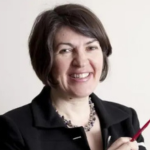Our Practitioners Must be Prolific Wordsmiths who Immerse Children in Rich Language

The richer the language children hear and acquire, the greater their success…

- by June O'Sullivan OBE
- CEO of the London Early Years Foundation Visit website

We recently held the annual LEYF conference. It’s a joyous occasion where 500+ staff come together to learn. This year we called our conference ‘The Wondrous World of Words’. We wanted to focus on the importance of language.
LEYF is a social enterprise with a pedagogy designed to support cultural capital. What that means in reality is that we must create language and literacy-rich nurseries. Why? Because we believe that the more and the richer the language children hear and acquire, the greater their success in our literate world.
This requires staff to understand how children acquire language and become readers. They need to be prolific wordsmiths, great readers and storytellers, and fabulous conversationalists. They need to introduce children to wonderful, ornate, flowery and effusive words.
Is it good enough to describe a dinosaur as ‘big’? No, we also need words such as gigantic, enormous, huge, large, gargantuan, colossal, titanic and massive – and to be able to use them in context. We need to be confident storytellers to encourage children to become readers. That means applying the rhythm, tone, stress and intonation of prosody when talking and reading with them.
Something that’s influenced us is the report ‘The Early Catastrophe: The 30 Million Word Gap by Age 3’ conducted by University of Kansas researchers Betty Hart and Todd R. Risley (2003). They found that the number of words their test subjects heard varied greatly along socio-economic lines: on average, children from families on welfare were provided half as much experience of language as children from working-class families, and less than a third of the experience given to children from high-income families.
In reality, children from families on welfare benefits heard about 616 words per hour, while those from working-class families heard around 1,251 words per hour, and those from professional families heard roughly 2,153 words per hour. Thus, children from better financial circumstances had far more language exposure and richer vocabulary. This is significant when we know the achievement gap between children from different socio-economic groups opens up at 22 months, and by GCSE children from disadvantaged backgrounds are two years behind their more affluent peers.
Luscious language
One of the conference presenters, Alice Sharp from Experiential Play in Scotland, challenged staff to reflect on the quality of the language used with the children.
She asked how we tended to use language with the children: did we use long, luscious words? Did we extend what the children said with more descriptive words? Were we using ribbons and dance to bring joy to our daily chat? Were children using their ribbons to create great ripples of rhyme? Did we present resources in an exciting way that introduced new words? When did we last build a volcano of vocabulary? Would beautiful words erupt and fill the nursery? Were we standing back enough and observing our children’s chat?
She asked if we had a candelabra or a chandelier in our role-play area, so those words became part of the children’s daily vocabulary. She challenged us to consider if we were sharing this well enough with parents. Were we using the LEYF pedagogical conversations to inform and persuade them of the benefits of rich language?
At the conference, I announced that all LEYF staff would be known from now on as LEYF teachers. It was well received by staff, who recognise their job is to teach. This makes it all the more important that we understand our role in doing so. Good teaching is driven not by qualifications but by an ability to be a continuous learner – willing participants in an ongoing pedagogical conversation.
June O’Sullivan MBE is the CEO of the London Early Years Foundation. Visit leyf.org.uk, June’s blog at juneosullivan.wordpress.com or connect on Twitter @JuneOSullivan.










